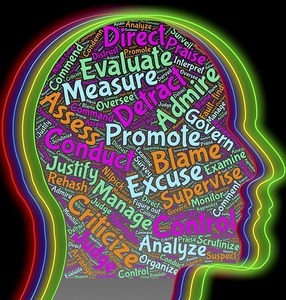Have you ever thought you might be too judgmental? Before answering, let’s figure out what it means to be judgmental in the first place.
To live fully you need to become wise, which includes being selective. Yet many of us shut down developing our ability to discern in fear that we might become too judgmental. Ironically, criticizing ourselves for evaluating things just stokes our inner critic more.
As a result, on the one side, we may become timid and stuck. On the other side, we may become harshly critical. In either case, we are falling victim to becoming judgmental, whether too meek or too critical.
In other words, you can become a mute or a loud boor.
So you can see that there is much confusion about being judgmental, which we hope to clarify in this article.
Judging or Evaluating?
Sometimes people mistake evaluating for being judgmental.
 To be able to evaluate objectively is a powerful tool for your development. It helps you understand and create. Evaluating uses your higher mental powers and subtler emotional connectivity. By contrast, being judgmental causes separation and restrictive emotions, like fear, anger and resentment. Being judgmental toward others ultimately devalues yourself, whether you think you are “better than” or “worse than” others.
To be able to evaluate objectively is a powerful tool for your development. It helps you understand and create. Evaluating uses your higher mental powers and subtler emotional connectivity. By contrast, being judgmental causes separation and restrictive emotions, like fear, anger and resentment. Being judgmental toward others ultimately devalues yourself, whether you think you are “better than” or “worse than” others.
Judging another: Who does she think she is?
Underlying self-judgment: I’m better/worse than her.
Evaluation: Her tone seems to be arrogant and she is using negative words to describe the other person’s race.
What is Evaluation?
Let’s look at evaluating a little further. When evaluating, you note what is similar and what is different between things. For example, if you are considering between two trainings, what is alike and what is different in the offerings.
Also, evaluating brings in your intuition. What do you sense that is beneath the words? What do you feel about the way things are presented?
For our training example, what is the website design and how does the language feel to you? Does it seem aligned with what you are more deeply looking for?
Evaluation also picks up the subtext in conversations, what is called non-verbal language. This means the tone, facial gestures and expressions speak to core parts of the brain and should align with the actual verbal message. If a person offers an attractive training, but if it seems hyped, or by contrast, underwhelming, your evaluation will be negative.
What is Being Judgmental?
We can learn from some sound advice for raising children: criticize the behavior not the child. Negative feedback can help or hurt a child, depending on what we say, and how we say it. It’s constructive to say, “Stop and look before you cross the street so you don’t get hurt.”
On the other hand, criticizing a child (or adult) for who she is ─ her identity ─ is being judgmental. It’s devaluing the person, not just a problematic behavior. Such as saying, “How can you be so stupid to run across the street!”
Judgements condemn yourself, or another, as less than, unworthy, a failure. The message is that you are bad or worthless. We all can all default into being judgmental when we don’t feel safe and whole.
A Personal Example
One time Phillip was stopped at a red light and looked over and noticed a young man at a gas station cleaning his car window. Phillip suddenly made a judgment about this young man over his appearance. Fortunately Phillip observed his judgmental thinking.
Phillip did some processing on himself over this sudden negative reaction over this young stranger he happened to notice, who sparked off some unwarranted criticism in his thoughts.
Phillip tracked this thinking to a feeling of undeserving in himself. By thinking he was above the other person, he in effect was compensating for himself, as irrational as it might seem.
But judgments of either self or others are not rational. They can take a fault or misbehavior and reject the whole person as if they were damned and irredeemable.
(That person you are judging tends to connect with a part of yourself that needs healing and compassion too.)
Judgments are based on fear, defense mechanisms and bad coping behavior.
Yes, the person might have shabby clothes and may be behaving badly, but the person still is a human with a soul.
Returning to the example, Phillip then did some holistic EFT tapping and felt lighter and more whole. In retrospect, he was glad the silent judgment did not go unnoticed, so he could confront it and correct it.
Final Thoughts on Being Judgmental
In sum, to evaluate is good, to judge is problematic. Evaluating builds your different intelligences (physical/brain, emotional, and spiritual), whereas judging condemns a person for who he or she is.
Ultimately the accusing fingers point back to ourselves.
We’re all guilty of judging sometimes. It’s a way of protecting our hurt and fragile immature parts inside of us. The goal is to reduce this tendency by self-observation and then healing and forgiving.
We have too much in common, too much good, to let our real or imagined faults rift us apart.
[pullquote align=”normal”]We have too much in common, too much good, to let our real or imagined faults rift us apart.” [/pullquote]
